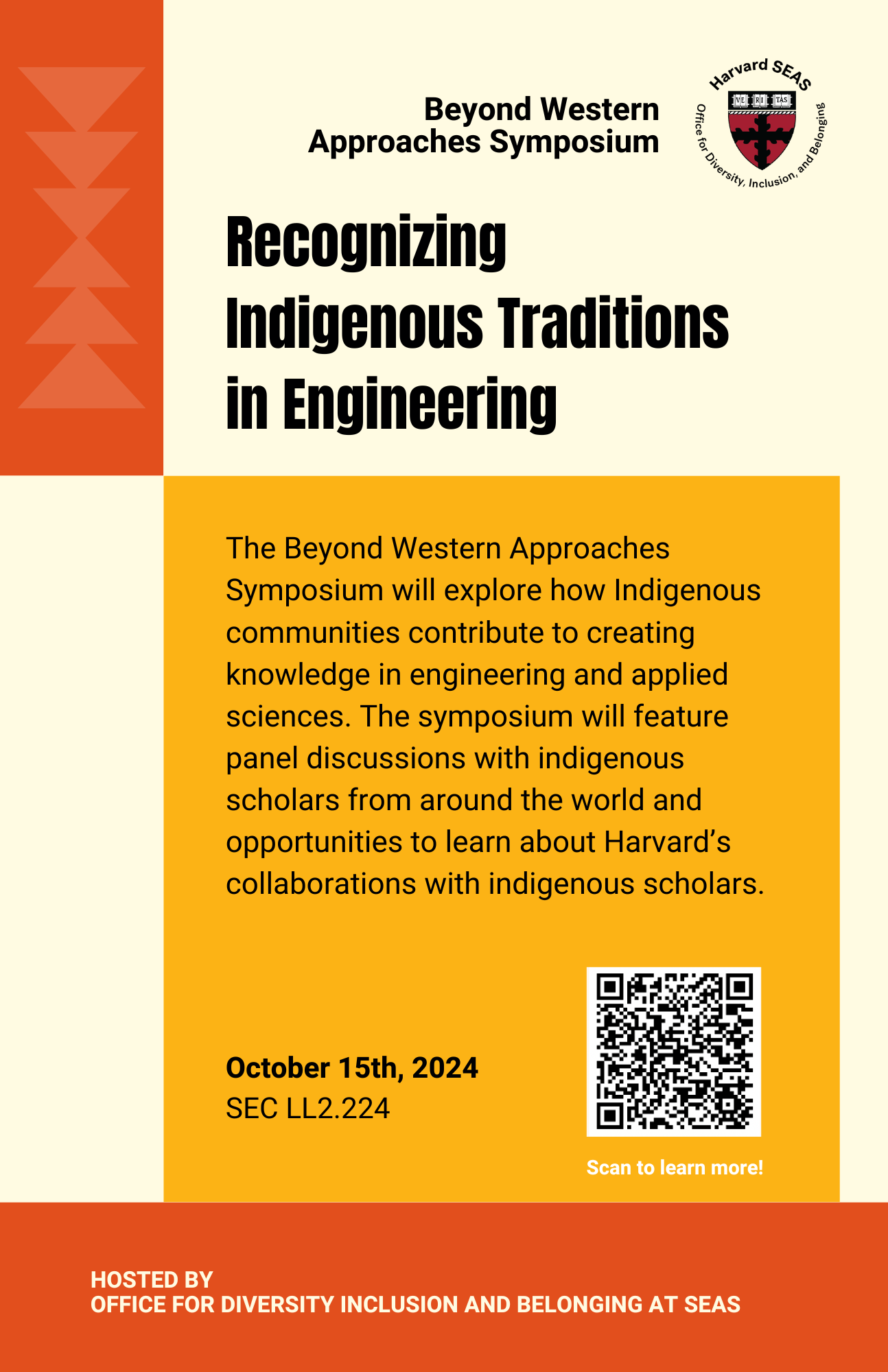Beyond Western Approaches: Recognizing Indigenous Traditions in Engineering
Harvard SEAS Office for Diversity Inclusion and Belonging invites you to join us for the symposium Beyond Western Approaches: Recognizing Indigenous Traditions in Engineering. The symposium invites us to expand the canon in STEM by exploring how Indigenous communities contribute to creating knowledge in engineering and applied sciences through new data, novel solutions, and culturally embedded frameworks for research design, interpretation, and application.

Event Details:
Date: October 15th
Time: 3-6 PM
Location: Science and Engineering Complex, 150 Western Ave, Room LL2.224
Link to registration: RSVP
Anyone with a disability who would like to request accommodations or who has questions about physical access may contact diversity@seas.harvard.edu in advance of the program.
Engaging Indigenous Communities: Exploring Gold Mining's Environmental Impact through the Havard-UTEC Fieldwork Program
This panel brings together faculty from the Harvard John A. Paulson School of Engineering and Applied Sciences and partners engaged with indigenous communities to discuss collaborative efforts that engage engineering students and create new knowledge through bilateral partnerships. Panelists will share their experiences with undergraduate courses and research projects that connect SEAS students and researchers with Indigenous communities. Through these experiences, students gain culturally competent training and applied learning opportunities, while communities help shape engineering solutions that respect traditional knowledge and practices. The panel aims to demonstrate how respectful, long-term relationships between academic institutions and Indigenous peoples can provide transformative and mutually beneficial outcomes that advance engineering. Attendees will gain insight into best practices for initiating and sustaining ethical, community-engaged work with Indigenous partners.
Advancing Indigenous Engagement in Engineering Through Partnership: The Harvard-Navajo Technical University PREM Collaboration
This panel brings together Harvard University's Materials Research Science and Engineering Center (MRSEC) and Navajo Technical University faculty to discuss their ongoing Partnership in Research and Education in Materials (PREM) collaboration. Through the Research Experience for Undergraduates (REU), Post-Baccalaureate Program, and K-12 Teacher Engagement, the PREM program advances NTU’s efforts to build indigenous capacity in STEM and supports cutting-edge materials research. The panel aims to demonstrate how this long-term academic partnership advances the discipline by fueling research and fostering native leaders in engineering. The discussion will also explore how the partnership model has strengthened both institutions.
Culturally Grounded Research: Indigenous Students’ Perspectives on Engineering Solutions for Their Communities
This panel centers Indigenous student-scholars in a discussion of the ways they engage their research in engineering and applied sciences through the cultural frameworks of their communities. Panelists will share how integrating Indigenous knowledge enhances their work, from informing relevant research topics to identifying methodologies and analyzing data to implementing solutions. The students will share strategies for applying culturally grounded research to solve urgent problems experienced by their peoples, with a critical focus on demonstrating how community-centered approaches can lead to better-implemented and sustained solutions within native communities. By elevating Indigenous student voices and knowledge systems, this panel aims to illustrate how culturally informed research can provide novel perspectives and more effective real-world impacts, with attendees gaining insights into the value of Indigenous frameworks for enhancing engineering and applied sciences education and research.
Native Contributions Symposium
October 15th
3pm - 5pm
Science and Engineering Complex, Room LL2.224
Registration link
Harvard University is located on the traditional and ancestral land of the Massachusett, the original inhabitants of what is now known as Boston and Cambridge. We pay respect to the people of the Massachusett Tribe, past and present, and honor the land itself which remains sacred to the Massachusett People. At SEAS, we value and welcome Native ways of knowing that can inform and advance our mission.